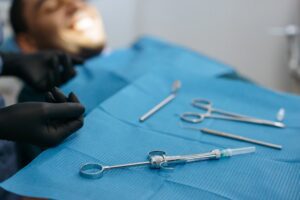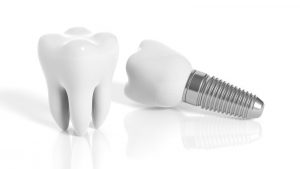Oral health is a crucial part of having a healthy pregnancy. Poor mouth health, including gum disease or other low-grade infections, can compromise the immune system of both parent and child. It only makes sense—having bacteria buildup in your mouth that necessitates tooth removal and getting a high-grade titanium dental implant or worse just isn’t good for anyone involved. However, any pregnant person knows there are myriad precautions people are supposed to take considering any kind of medical care. Certain procedures or medications aren’t good for pregnant people or the children they’re carrying. What about oral surgery? Should you hold off on scheduling a visit with your local dental surgeon who performs tooth extractions to get those wisdom teeth pulled out of your mouth?
We’ll break down the general safety guidelines for oral surgery safety during pregnancy: what’s recommended, what’s not, why, and how to navigate balancing oral health with the health of the parent and baby. If there’s something we didn’t cover here that you’re wondering about, get in contact with an oral surgeon with years of experience to talk about what is and isn’t safe while you or a loved one is carrying a baby. Your oral health is our number one priority, especially during those extra special nine months.
Oral Care that’s Recommended During Pregnancy
Did you know that pregnancy often hurts your oral health? The high levels of progesterone and estrogen during pregnancy can weaken tissues throughout your body. This includes your gums and the bone that hold your teeth in place. That makes pregnant people significantly more susceptible to dental health problems like:
- Loose teeth
- Fallen out teeth
- Gum disease
- Receding gums
- Cavities
- Infections
As such, it’s recommended that pregnant people double down on their dental care for those crucial nine months:
- Brush twice per day
- Floss at least once per day
- Mouthwash daily
- Have a dental exam at the end of each trimester
- Avoid sugary and acidic foods
- Drink lots of water
If you are planning on getting pregnant, come see us first. That way, if there are any issues that require oral surgery, they can be treated before you become pregnant.
While you are pregnant, it’s important to stay in contact with your dental health expert to be on the lookout for any of the above signs. The last thing we would want to happen is to have a tooth fall out, requiring the need for a tooth replacement that integrates with your jawbone while you’re pregnant. Or needing to visit an oral surgeon who specializes in gum and soft tissue grafting. Or really anything that will hurt your mouth and oral health. It’s a well-known fact that carrying a little human takes a lot out of you, and sometimes it can take literal teeth out—that’s why it’s important to be extra rigorous with your oral hygiene during this special time.
Oral Surgeries that are Safe During Pregnancy
The general recommendation for pregnant people and oral surgery is to limit procedures to necessity only. Basically, if it’s more dangerous to the fetus than it is to your oral health, we will try to wait, monitor and do what we safely can until the pregnancy is over and we can fully treat the problem without threatening the health of parent or child. However, in the case of certain events, like a traumatic experience that requires full reconstruction of the mouth and jawbone or incredibly advanced periodontitis that requires grafting of the bone along the jaw, exceptions will need to be made to restore the patient’s overall health and oral wellbeing as soon as possible. In the event that this does happen, yours and your baby’s safety are our top priorities.
However, minor dental procedures can be safe to perform during pregnancy, especially with an oral surgeon skilled at holistic approaches to oral surgery:
- Fillings/bondings
- Tooth extractions
- Root canals
- Biopsies
As a general rule, anything that only requires local anesthesia is likely safe to perform during pregnancy with careful management during the procedure as well as through recovery. Anything like removing impacted wisdom teeth, receiving any number of dental implants, and other non-invasive oral surgeries are fair game. Typically, these procedures are done outpatient, and they’re fairly quick to get done comparatively to other more intensive procedures, making them a near-zero risk for pregnant people.
Dental Procedures that are Unsafe During Pregnancy
The more intensive a surgery is, the more anesthesia it requires and the more recovery it entails. And the more elective an oral surgery is, the more likely we are to wait until the pregnancy is over before we perform it. Oral surgeries not recommended for pregnant people include:
- Procedures that require general anesthesia
- Procedures that require post-op antibiotics and painkillers
- Elective procedures
- X-rays are avoided in the first trimester of pregnancy
There are times when there is no other option. For instance, a pregnant person who experiences facial trauma will require maxillofacial surgery to reconstruct their jaw – that’s just the reality. A visit to a talented maxillofacial surgeon can help, and they’ll do everything in their power both during the mouth reconstruction procedure and in the recovery period to keep both parties safe. Life-saving oral surgeries like that are sometimes a necessity while pregnant due to unfortune circumstances. But a patient who needs a dental implant to replace a cavity they got in the first trimester? We will likely extract the tooth, preserve tissue health with a small graft, and wait to do the implant reconstruction. Teeth can handle waiting until after pregnancy, and you’ll be glad you waited to visit a dental surgeon who implants high-end replacement teeth until the pregnancy is over. With how bad pregnancy can affect your oral health, it’s always safer to wait until the baby has been delivered and is out of the patient’s body to begin working on the extra-sensitive teeth and surrounding mouth area. Plus, being pregnant and being on the mend from an oral procedure? That doesn’t sound too fun to us!
Oral Surgery Recommendations for Soon-To-Be Parents
Each trimester of a pregnancy is crucial in a different way. The first trimester is the most sensitive time in a pregnancy, full-stop, as more than half spontaneously end before the trimester is up. Second trimester is full of rapid development of crucial organs and structures, but is generally more stable and a better time for any necessary minor work to be done. If you need to visit an oral surgeon near you for anything like root canals, getting bonding put on a chipped tooth, or having a ceramic tooth replacement installed, those things are all fair game during the second trimester. If a pregnant patient needs work done, we’ll usually try to hold out until the second trimester.
You might be surprised to hear that when it comes to oral surgery, the third trimester is something we try to avoid interfering with entirely. At this stage, the pregnancy is very sensitive – you’re dealing with the period of viability, and anything that may disrupt those pre-labor processes can have catastrophic consequences for both parent and child. Again, if the need arises to visit a dental surgeon who specializes in facial trauma in the event of an unfortunate accident, we’ll do everything in our power to keep both parent and child safe during the full-on mouth reconstruction procedure.
In all, we recommend getting ahead of pregnancy-related risks to your oral health by having a comprehensive exam performed by an experienced oral and maxillofacial surgeon before you conceive. That way not only can you ensure your oral health is at its best before you enter such a sensitive time for your health, but also so a dental professional is familiar with your oral health to monitor those crucial nine months with you.










